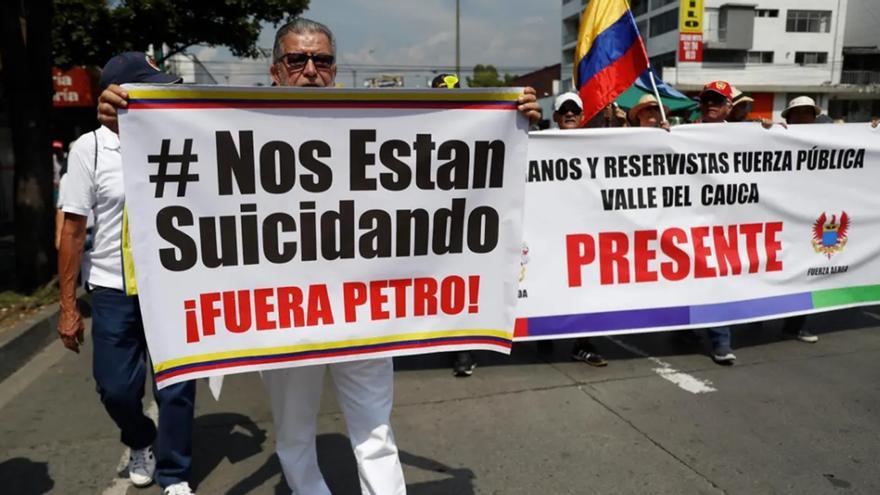
![]() 14ymedio Pedro Corzo, Miami, 7 October 2023 — I visited Colombia a few days ago on a tourist and family trip. In both visions I could see that the Government doesn’t have much sympathy. A significant number of those who say they voted against President Gustavo Petro seriously question those who elected him. Even more, I saw graffiti on historic walls that, among other criticisms, asked the president why the cost of living had become so expensive.
14ymedio Pedro Corzo, Miami, 7 October 2023 — I visited Colombia a few days ago on a tourist and family trip. In both visions I could see that the Government doesn’t have much sympathy. A significant number of those who say they voted against President Gustavo Petro seriously question those who elected him. Even more, I saw graffiti on historic walls that, among other criticisms, asked the president why the cost of living had become so expensive.
When I traveled to Venezuela for the recall referendum, in 2004, I told my Venezuelan friends that I had the perception that, with or without cheating, Hugo Chávez would win. Now I wonder how Petro won the elections last year if most of the people I talked to, almost entirely unknown, spoke against him. I did not see any fear of the authorities, since the individuals talked freely.
My first stay was in the fabulous Cartagena de Indias. It is a city full of contradictions. Its historic walls always move me, but what pleasantly impressed me was the progress in the modern area called Bocagrande. Hopefully Gustavo Petro will not be determined to destroy the development achieved, as his peers in Cuba, Venezuela and Nicaragua did when they took power. Their eagerness to curtail freedoms and end economic and social advances is unhealthy and criminal.
When I traveled to Venezuela for the recall referendum, in 2004, I told my Venezuelan friends that I had the perception that, with or without cheating, Hugo Chávez would win
Bocagrande – or South Miami, as some call it – is beautiful, vibrant and rich, with the busiest beaches in that part of the country, although I confess that I still prefer the walled city, with its convents and its legends of apparitions. By the way, the assistant in a bar we visited told us that she would never be alone in that place because she had already had a scare. In addition, the churches, aged buildings, car rides and the San Felipe de Barajas castle transport us back in time.
The history of that part of the city is that of the entire hemisphere, of our most emblematic villas of the colonial era, in which at least two Cuban cities are distinguished, Havana and Trinidad. By the way, one of the guides told us that a certain Cuban was considered a hero in colonial times, for his leadership in an insurrection.
In Cartagena, at one of the restaurants where we had lunch, I sampled my first coconut lemonade, a real feast for the palate. There, inadvertently, politics broke out. The lady who served us, realizing that we were all Cubans with the exception of my wife, brought out her artillery against the president. She described how much life in the region had changed for the worse and the many fears about the future that overwhelmed the citizenry, both rich and poor. She was critical of the presidential flirtation with irregular groups, including drug traffickers, and of his approach to the dictatorship of Nicolás Maduro.
Our arrival in Medellín coincided with Petro’s visit to the United Nations, where he was snubbed and overshadowed by the remarks against the mayor of the city, Daniel Quintero, an ally of the president.
Quintero is noted for having forged a strong business alliance with Venezuelans who enriched themselves under the autocracies of Hugo Chávez and Nicolás Maduro
Quintero is noted for having forged a strong business alliance with Venezuelans who enriched themselves under the autocracies of Hugo Chávez and Nicolás Maduro. A harsh report by the newspaper El Colombiano describes a network of interests, which offers grounds for a judicial investigation so that a conscious electorate does not vote for the candidate who supports the current office holder.
In the capital of Antioquia, in the face of renewed criticism of Petro, I asked again how he had been elected. The answer did not surprise me: my interlocutors said that it was the vote of the young people, trusting in the Petrist promises, that brought him to power. A pity, because the leaders resemble the brothers Castro, Chávez, Maduro, Daniel Ortega and Evo Morales, in my opinion Gustavo Petro’s fellow travelers, the ones who most damage the possibilities of achieving a society like the one that the despots promise in their speeches.
I told my friends Horacio and Consuelo Puertas that Colombia enjoys spaces that no longer exist in the Castro-Castrochavista States, with a very energetic civil society that will be difficult to crush. However, I suggested with great respect that they could not be negligent, because “the shrimp that falls asleep is carried away by the current.”
Translated by Regina Anavy
____________
COLLABORATE WITH OUR WORK: The 14ymedio team is committed to practicing serious journalism that reflects Cuba’s reality in all its depth. Thank you for joining us on this long journey. We invite you to continue supporting us by becoming a member of 14ymedio now. Together we can continue transforming journalism in Cuba.
